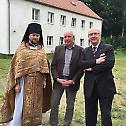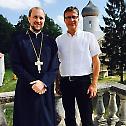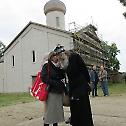When Do Tourists Become Pilgrims?
Igumen Daniel (Irbits), Abbot of the Monastery of St. George in Götschendorf (Germany), analyzes the characteristics of Christian pilgrimage, and when it has a good effect and when a harmful effect on the human soul.
—Fr. Daniel, is there such a problem as “spiritual tourism”? If it does exist, then how, in your opinion, does it manifest itself? What are its negative effects on both “spiritual tourists” and monasteries?
—I will speak on the basis of our local experience in Germany, still a modest experience of our small monastery in Götschendorf.
At our St. George’s Monastery we are faced with the phenomenon of “spiritual tourism”, as you call it.
Our monastery is often visited by groups of Germans. These are local Evangelicals and Roman Catholics, representatives of federal and regional authorities of Germany, and public figures. Among our visitors was Eduard, Prince von Anhalt, head of the Ducal House of Saxony. I cannot call all these visits “pilgrimages”. But thanks to encounters like these Germans can know the Russian Orthodox Church and our Russian culture better. And that is of great importance for us, for through such meetings we can bring the light of our faith to the German society and elsewhere.
Let me be quite frank: in many cases people after their acquaintance with Orthodox Christianity in the German lands, German have with time embraced the Orthodox faith. For example, last year the first baptism was performed at our monastery—a young German woman was received into the Orthodox Church.
We live in a non-Orthodox country; to be more precise, we live in the state of Brandenburg—in its predominantly Protestant area—and for native residents (Protestants and atheists alike) the very presence of a Russian Orthodox monastery in the region is something extraordinary; and believe me, it evokes great interest. In my opinion, it is very important that we answer to their interest not with pharisaical arrogance but with our benevolence and willingness to help them get to know Christ.
—That is very well, and may the Lord grant health (including spiritual health) to Germans. However, their visits to your monastery and those of Orthodox believers are different by nature.
—You are absolutely right. The St. George’s Monastery is situated in a conservation area ninety kilometers (fifty-six miles) away from Berlin, and public transport is very limited here. Our place of Orthodox worship is rather new and still not “prayer-soaked”, as some put it; and when pilgrimage groups come we are happy to pray together, to share our meal with them, to show them around our monastery, to tell about our monastic life here, and to answer their questions about spiritual life.
It is not a kind of “spiritual tourism”, nor is it fully-fledged “pilgrimage”. But we are already on that path. True, our monastery keeps relics of saints, but many city churches have holy relics as well. And is it acceptable to use relics as “the magnet to attract pilgrims”?
We don’t have spiritually experienced confessors and holy elders either; I will repeat myself—our monastery is young. As the saying goes, to every thing there is a season: I feel certain that many years will pass and one day our monastery in the German land will become a spiritual center, attracting numerous pilgrims not only from Germany, but also from Russia, Ukraine, Belarus and other countries where Orthodoxy is still preserved.
—What is the significance of genuine pilgrimage? All the minuses aside, genuine pilgrimage exists. It means that people feel an urge to visit holy shrines (not because “one old lady told us to do it, or one Orthodox pilgrimage agency recommended it to us”), that they (if even instinctively) have a craving for God, for light. And at a monastery this craving is satisfied. Perhaps sometimes people come to the monastery as tourists and leave it as believers or at least “sympathizers”. Can you support this opinion of mine with your own observations?
—It is extremely important that my guests and pilgrims should have a very deep (and not superficial) understanding of our faith; they should understand that Orthodoxy is not just “earth from saints’ graves, oil lamps’ oil, intercession lists, supplicatory services, prayers for various needs, etc.” Orthodoxy is much more—it is something deep, personal, internal.
Yes, surely, in some cases tourists indeed become pilgrims. But the primary cause is not the monastery. It is a result of a soul’s spiritual longing for God and the Lord’s reply to calls and cries of the heart.
Communication with spiritually experienced people [and not “young elders”—a widespread problem of the Church in the post-Soviet Russia—ed.] and attendance at church services are essential too. They may lead people into the arms of the loving God.
—Pilgrimages to monasteries and convents have always been considered as acts of piety. When do tourists become pilgrims? When, figuratively speaking, do they replace their cameras with palm branches for Christ?
—There is nothing bad about cameras, provided somebody wants to take pictures of holy sites so that he and his descendants could hold on to memories of that visit. That is very good, but one should remember one important thing.
A pilgrimage is not a mere visit to a geographic location; it is a spiritual exercise which involves physical strain, prayer, meditation, repentance for sins, taking Holy Communion and being with the Lord alone.
But if it is reduced to mere “visiting an attraction” with the view of “venerating all its relics”, walking around its territory, buying many souvenirs, and quickly asking priests questions about the nature of the universe, then it is certainly not the path of a pilgrim.
—Any stranger at a monastery willy-nilly attracts the close attention of its inhabitants. He appreciably “stands apart from the rest”, thus interfering with the daily routine of the monastery. So is it appropriate to be indignant with pilgrims? Doesn’t it mean that you feel annoyed with people, your brothers and sisters (who are not always believers), in general? Isn’t it the same as expressing annoyance at misusing “right things”? So how should we react to pilgrims and tourists at a monastery (we will not talk about drunkards and other people who don’t really understand what is going on)?
—I think we shouldn’t be annoyed with anybody. We must accept all who come to us regardless of their mental and spiritual state.
Even if somebody is a “spiritual tourist”, our task is to help him understand the real motives of his journeys and lift his eyes from his “outward religiosity” up to heaven and God.
Our primary task is to serve such people, hear them out, do our best to help them, and—if we see that something is wrong with them—instruct them, as did our Lord Jesus Christ.
—What would you like to say to prospective pilgrims?
—I am of the opinion that any pilgrim travelling to a monastery should keep the following two simple truths in mind:
The first truth is that a monastery is a place where people come to live in a community of monastics in solitude, and at times an intrusion into this community for idle curiosity or entertainment is inappropriate. After all, we never go into the homes of people we don’t know only because “we just want to have a look”!
The second truth is that we should seek God everywhere, no matter where we are. And it is possible to find Christ anywhere, as the Savior Himself said to the Samaritan Woman: believe Me, the hour cometh, when ye shall neither in this mountain, nor yet at Jerusalem, worship the Father (Jn. 4:21). And further we find a requisite for true worship, prayer and even pilgrimage: But the hour cometh, and now is, when the true worshippers shall worship the Father in spirit and in truth: for the Father seeketh such to worship Him (Jn. 4:23). Now let us ask ourselves pointblank: Will the Father find such worshippers among us?
Glory be to God, holy places are plentiful. But I must warn you that physical contact (with a holy site) alone does not guarantee that you will receive “a charge of spiritual energy” (a terrible expression, I should admit!) and divine grace. We should always remember that the Lord abides in every soul and every heart that can love. The Lord is here and now in every point and at every moment, and He ever sees, hears and loves His children. I will repeat myself: Spiritual life is our inner life—something that lies within us, not outside. And may the Almighty help all of us to be sincere, loving, to do good. Faith without good works is dead (cf. Js. 2:17); and if so, no pilgrimages to holy shrines will ever save our souls.
Peter Davydov
spoke with Igumen Daniel (Irbits)
Translation by Dmitry Lapa
Source: Pravoslavie.ru










